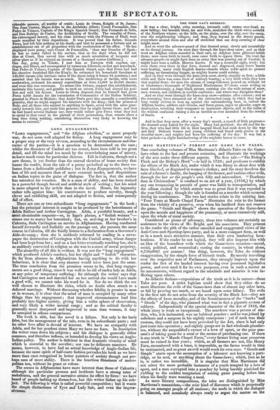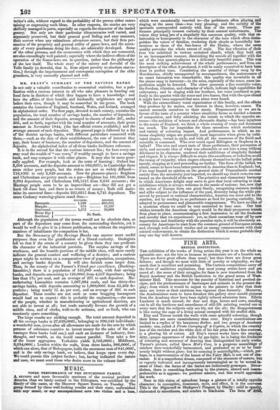MISS MARTINEAU'S FOREST AND GAME LAW TALES. THE concluding volumes
of Miss Martineau's didactic Tales on the Game- laws relate to the last and present centuries, and illustrate the workings of the acts under three different aspects. The first tale—"The Bishop's Flock and the Bishop's Herd "—is laid in 1723 ; and professes to exhibit the effects of the Black Act, under which it was felony to shoot deer with faces blacked, or disguised in women's clothes ; and the story involves the rain of a farmer's family, the hanging of the farmer, and various other evils, through the law or the people's own folly and misconduct. " Heathen- dom in Christendom" is confined to an act of a year, (1816,) by which any one trespassing in pursuit of game was liable to transportation, and the odium excited by which statute was so great that it was repealed in the year following; though the tale is founded on a murder which occurred during its continuance. The two last stories relate to the existing law. "Four Years at Maude Chapel Farm" illustrates the ruin to the farmer from the vicinity of a preserve, even when his landlord does not reserve the game. " Gentle and Simple" shows the operation of the Game-laws upon the morals and happiness of the peasantry, or more extensively still, upon the whole of rural society...............
Considered as pieces of advocacy, these two volumes are certainly an assistance to the views of Mr. Bright and his associates. , They present to the reader the pith of the rather onesided and exaggerated views of the Anti-Corn-and-Sporting-laws party, and in a more compact form, as well as in a much more attractive manner, than their own lumbering limn- brations. If the reader be not logical, they will also impresa him with an idea of the boundless evils which the Game-laws occasion—moral, social, political, and economical ; costing the country, in wheat alone, 8,750,0001. per annum I One thing, however, the Tales do without exaggeration, by the simple force of historic truth. By merely travelling over the respective acts of Parliament, they strongly impress upon the reader the fact of the landed interest having ever possessed legislative power, and ever used it for its own purposes, even in such a matter as its amusements, without regard to the mischiefs and miseries it was in- flicting upon others. As didactic fictions—expositions of the truth as it is in nature—these Tales are poor. A strict logician could show that they either do no more illustrate the evils of the Game-laws than of almost any other laws, or fail by proving too much, or are based upon some fallacy. The evils in the first tale do not arise from the severity of the Black Act—they are the effects of loose morality, and of the licentiousness of the "backs "and " bloods " of the day, who planned what was in fact a gigantic system of robbery. Independently of the special character of the Act of 1816, the whole story is weak or exceptional. The murderer was a person of sta- tion, who, it is insinuated, was an habitual poacher ; and he was joined by solicitors and a surgeon in his nightly enterprises : yet if such was their custom, they could not have been provoked by the Act, since it bad only just come into operation; and nightly gangs are in fact wholesale plunder- ers, without the unqualified's excuse of a love of sport, or the poor pea- sant's of taking game for a meal or the means of purchasing one. If there is any truth in "Maude Chapel Farm," every farmer living near preserves must be rained in four years ; which, as all farmers are not, like Henry Earn, encumbered with a lease, is impossible, as the farms would in time be untenanted, and so great an evil would work its own cure. " Gentle and Simple" starts upon the assumption of a labourer not knowing a part- ridge, or its nest, or anything about the Game-laws; which, lout as be is, is rather too incredible. It is singular that Miss Martineau did not select the more probable instances of a youth tempted by a love of sport, and a man corrupted into a poacher by being harshly punished for yielding to the sudden temptation of seizing game passing before him when his family were wanting a meal. As mere literary compositions, the tales are distinguished by Miss Martineau's mannerism,—the wise kind of discourse which is perpetually going on amongst people of all stations • the mode in which the dialogue is balanced, and somebody always ready to argue the matter on the writer's side, without regard to the probability of the person either enter- taining or expressing such ideas. In other respects, the stories are very skilfully managed in parts, especially as regards the character of the landed gentry. Not only are their particular idiosyncracies well varied, and separately preserved, but their general good feeling and easy manners, their sorrow when any calamitous adventure occurs, but their firm per- suaaion of the propriety and general utility of game-laws, and the neces- sity of every gentleman doing his duty, are admirably developed. Some of the other persons, and the occurrences with which they are connected, are also exceedingly well painted ; especially where the indirect effects of the operation of the Game-laws are in question, rather than the philosophy of the law itself. The whole story of the misery and downfal of the Voile family (a downfal, that is, from abject poverty to absolute starva- tion,) through the imprisonment and consequent corruption of the elder grandson, is very naturally planned and told.



























 Previous page
Previous page